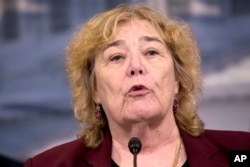In a story Jan. 31 about H-1B visas, The Associated Press reported erroneously that proposed legislation could require more companies to prove that they have tried to hire U.S. workers before hiring foreign workers on H-1B visas. The change would actually force more companies to make a good faith effort to hire U.S. workers before considering foreign workers. The following is the corrected story:
The shares of top Indian IT companies sank Tuesday in response to news of proposed U.S. legislation that could make it harder for companies to replace American workers with those from countries like India.
By late afternoon shares of all the main IT companies, like Infosys, Wipro and Tata Consultancy Services, had fallen 2 percent to 4 percent on the Bombay Stock Exchange. The IT sub-index on the exchange, which comprises all the tech firms trading on the stock exchange, shed more than 3 percent.
The High-Skilled Integrity and Fairness Act of 2017 introduced last week in the House of Representatives by Rep. Zoe Lofgren, a Democrat from California's Silicon Valley area, aims to end what it calls the "abuse'' of the work visa program, which it says has "has allowed replacement of American workers by outsourcing companies with cheaper H-1B workers.''
The H-1B program allows high-tech companies to hire foreigners with technical skills in the U.S. for three to six years. If enacted the legislation would raise the minimum annual salary for certain reporting exemptions to $130,000, from $60,000. The change could require more companies to make a good-faith effort to hire U.S. workers before considering foreigners.
The bill also includes prioritization for higher-paying jobs and would set aside 20 percent of H-1B spots for businesses with no more than 50 employees.
"My legislation refocuses the H-1B program to its original intent - to seek out and find the best and brightest from around the world, and to supplement the U.S. workforce with talented, highly paid, and highly skilled workers who help create jobs here in America, not replace them,'' Lofgren said on her website.
The proposed bill comes as the tech industry is already reeling from an executive order on immigration from President Donald Trump that bars nationals of seven Muslim-majority countries from entering the U.S.
The U.S tech industry relies on foreign engineers and other technical experts for a sizeable percentage of its workforce.
While the tech industry insists the H1-B program is crucial, critics say it puts American programmers and engineers at a disadvantage. Trump's nominee for attorney general, Sen. Jeff Sessions, has long opposed the program.
In New Delhi, a foreign ministry spokesman issued a one-line statement.
"India's interests and concerns have been conveyed both to the U.S. administration and the U.S. Congress at senior levels,'' Vikas Swarup said.





